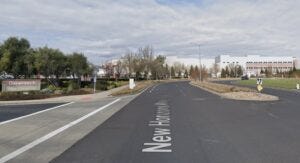
Roche is planning to sell or close the legacy Genentech facility in Solano County, California citing a shift in its pipeline from large-scale monoclonal antibodies to more personalized modalities.
In 1994, Genentech chose to invest $250 million to build a manufacturing facility to support its burgeoning biologics portfolio. When it opened four years later, the Vacaville facility was the world’s largest biomanufacturing plant.
Over the subsequent 25 years, the site has produced a number of monoclonal antibodies for Genentech – and then its parent company Roche – including best sellers Herceptin (trastuzumab), Avastin (bevacizumab), Rituxan (rituximab), and Actemra (tocilizumab), in response to the COVID-19 pandemic.

Image c/o Google
The original facility closed in 2010 due to overcapacity in the Roche network, but a second plant reopened at the site in 2015, boasting 427,000 square feet of manufacturing space and 8 x 25,000 L stainless steel bioreactors. According to BioPlan Associates’ Top 1000 Biopharmaceutical Facilities Index, the plant is only second to Samsung Biologic’s Songdo, Korea biocampus when it comes to global bioreactor capacity.
But now Roche has earmarked the plant for sale or closure as part of a readjustment of its network amid changing production requirements, the Swiss firm confirmed.
“Our pipeline has become more diversified across a range of modalities, from monoclonal and bispecific antibodies to cell therapies and personalized cancer vaccines,” a spokesperson told BioProcess Insider.
In 2016, Herceptin, Avastin, and Rituxan pulled in just under CHF 20 billion ($22 billion) in total sales, but with all three mAbs off patent and up against biosimilar competition worldwide, total 2022 sales were a mere CHF 6.34 billion ($7 billion).
Roche’s R&D strategy since 2013 has mostly focused on diseases targeting reduced patient populations. Meanwhile, the firm has invested heavily in new, more personalized modalities such as CAR-T and gene therapies.
“This requires production of increasingly individualized medicines for defined patient populations rather than the large-scale production of biologics that the Vacaville site specializes in,” the spokesperson said.
“Our goal is to divest the site to a buyer who shares our values and respects the contributions and expertise of our colleagues at the facility. At this time, there is no impact to operations or to our employees.” According to Reuters, the plant will close between 2028 and 2029.
The news comes two months after Roche signaled the end of another Genentech legacy plant. The South San Francisco, California site, which began production in 1983, is in the final stages of closure, again as part of a manufacturing rehaul. The nearby Oceanside plant, however, continues to operate and has even seen a $700 million investment by Roche, which includes the construction of a small-batch commercial plant.
About the Author
You May Also Like

schedl_b_and_w.jpg?width=100&auto=webp&quality=80&disable=upscale)
schedl_b_and_w.jpg?width=400&auto=webp&quality=80&disable=upscale)





